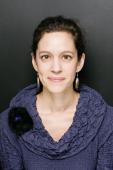Your Hosts


Where & When
In this ten-week Focusing course, we learn to use self-regulation and co-regulation to affect the interactions in our relationships. You can explore any relationships, including those that include power (leaders and employees, teacher and students, parent(s) and children). The goal is to use emotional regulation to create safe and connected relationships that allow for creativity and action to flow.
Psychological safe spaces are the most creative and innovative
An embodied leader is self-aware, informed by their body’s wisdom, and able to show up in ways that reflect their values and commitments, even under pressure. They also create spaces that foster creativity and action that is in flow. They do this by having high levels of emotional intelligence; being able to:
- be self-aware and self-regulate
- be aware of others and co-regulate
In this course, we spend ten weeks developing our embodied leadership skills, primarily using Focusing, emotional intelligence and learnings from psychological safety.
We do so by taking two PUPA process journeys: pause, understand, permutation, prepare, action. The PUPA process includes concepts from Otto Scharmer’s Theory U (from MIT) and Arawana Hayashi’s Social Presencing Theatre, positive psychology, the 8Cs of Self-Leadership (from Internal Family Systems) and doable action steps. Finally, our learning includes Timothy Clark’s 4 stages of psychological safety.
In our first journey, we become self-aware and unpack where we get in the way of the psychological safety of our relationships: where we armour up by becoming defensive. And then we envision how we’d like to be as an embodied leader who can self-regulate in a calm, grounded and courageous manner, and spend a few weeks embodying that person.
In our second journey, we dig into what our relationships needs from us to have even more psychological safety and learn to better co-regulate our each other (students, family members, friends, colleagues, team members, children, etc.) by showing up as embodied leaders and changing the way we lead.
We learn to build psychological safety as embodied leaders by learning to create:
- inclusion safety (noticing where we experience privilege, power and oppression)
- learner safety (destigmatizing failure)
- contributor safety (inviting meaningful participation and inquiry by asking good questions and learning to deeply listen to what is emerging now)
- challenger safety (welcoming courage, and providing cover for candor)
Format:
This group meets weekly, and our classes have four parts:
- centering exercise (e.g. breathwork, clearing a space)
- brief presentation of some material to guide our session
- experiential - guided Focusing experience that moves us forward on that week’s leg of our journey
- Focusing practice (sometimes with a demo first, and then always breakout room practice, including using groups of three or four for empathy circles and embodied Masterminding, or in groups of two or three for Focusing partnerships)
To further your practice, it is encouraged to also form a Focusing partnership with another participant. This involves meeting between classes to practice, in an exchange of Focusing and listening.
Timing and other details
Course Dates and Times:
-
Thursdays, 1:30-3:30 pm Eastern, May 1-July 3, 2025
Group size: Limited to 16 people
Who is this course for? The course is designed for all levels of Focusers. However, some previous Focusing training is required as you need to be able to access your Felt Sense and hold space (have practice in Focusing partnerships). This beginner training can be learned in Annette’s 4-week or 8-week beginner courses.
This course if for individuals who would like to use Focusing to improve their leadership skills in an embodied way. It is also for people who would like to improve their relationships, by looking at themselves as a catalyst for change, by improving the co-regulation of their relationships. Whether you’re in a position of power (leader), or a participant (e.g. a team member), you can learn to lead in an embodied way. And this will unleash creative action flow in your relationships.
Course location: Zoom
Sliding scale pricing: This course has sliding scale pricing, offering multiple price points to make the course more accessible and reduce financial barriers for people with different levels of income. Please view the sliding scale fees document for details and codes.
- Full fee: US$600
- 25% off: US$450
- 50% off: US$300
- 70% off: US$180
- 80% off: US$120
- 90% off: US$60
Notes:
-
This course is to deepen your Focusing and listening. Breakout room practice and practice in between classes help build those muscles. As such, live attendance is essential. That said, we recognize that sometimes an absence is inevitable. Therefore the classes are recorded and shared with you. This includes the guided exercises, slide teachings, demonstrations and group sharing. Breakout room practice is not recorded.
-
You can take this class as a stand alone experience, continue on with the whole PUPA journey, or whatever course or courses resonate with you.
-
Consisting of five courses, the journey covers learning Focusing, learning about who you are, discovering who you want to be and what you want to bring into the world with TAE, transforming a large block using the 8Cs of self-leadership, and finally a course on taking action with embodied leadership (this course).
- The journey can also be extended to the PUPA Focusing Certification Program, which includes additional requirements to become a Certified Focusing Professional with The International Focusing Institute.
Contact
Annette Dubreuil [email protected]
Registration Information and Price
See more here: https://pupa.ca/courses/embodied-leadership-creativity
